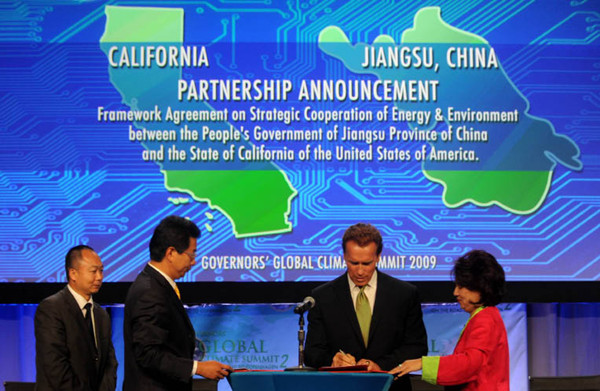China's role in global climate change challenge
 0 Comment(s)
0 Comment(s) Print
Print E-mail China Today, November 15, 2013
E-mail China Today, November 15, 2013
Climate change is one of the biggest challenges faced by the international community today. Over the past few years, the problem has received escalating global attention and China has made active efforts in dealing with climate change, meeting its obligations set by the United Nations Framework Convention on Climate Change (UNFCCC) and the Kyoto Protocol and playing a constructive role in international cooperation in the field.
International Dialogue
China has endeavored to promote international communication and mutual trust in coping with climate change, with the aim of establishing a transparent and effective global mechanism to deal with it. Under the dual-track negotiation mechanism defined in the UNFCCC and the Kyoto Protocol, China has participated in international negotiations on climate change, insisting on the principle of “common but differentiated responsibilities,” striving to enhance communication with different sides and playing a constructive role in urging joint efforts.
In various multilateral and bilateral meetings, such as the G8 Summit, G20 Summit, Asia-Pacific Economic Cooperation (APEC), East Asia Summit and Boao Forum for Asia, Chinese presidents and premiers have long expounded on China’s stance on coping with climate change and expressed determination to promote global action in this area.
China’s many affiliations with working groups on climate change demonstrate the country’s commitment to the cause. China is a member of the Carbon Sequestration Leadership Forum, the Methane to Markets Partnership and the Asia-Pacific Partnership on Clean Development and Climate, as well as a participant in the G8 and Developing Countries Talks on Climate Change and Major Economies Meetings on Energy Safety and Climate Change. At an APEC meeting, China advocated the founding of an Asia-Pacific Network for Sustainable Forest Management and Rehabilitation and hosted an International Forum on Climate Change and Science and Technology Innovation.
In terms of bilateral cooperation, China has established dialogue and cooperation on climate change with the EU, India, Brazil, South Africa, Japan, Canada and the U.K. and set climate change as an important item on the agenda. In April this year, the Chinese and U.S. governments signed the Joint U.S.-China Statement on Climate Change. They initiated a Climate Change Working Group responsible for implementing the collaborative plans set out by the two countries and also included the topic in the 2013 Strategic and Economic Dialogue.
At the Fifth Round of the Strategic and Economic Dialogue held in July, joint efforts in dealing with climate change became a new impetus to boost bilateral ties. The two sides agreed to cut emissions on heavy-duty and other vehicles, launch cooperation on carbon capture, utilization and storage, raise energy efficiency in buildings and industry, and build smart grids, which capture essential information on energy use. It is expected that these initiatives will enhance multilateral cooperation and help establish a new international protocol in coping with climate change by 2015.
Sci-Tech Cooperation
The Intergovernmental Panel on Climate Change (IPCC) assesses the scientific, technical and socio-economic information relevant to the understanding of the risk of human-induced climate change. China supports this and has sent delegations to every IPCC meeting. China also organizes research and submits reports relevant to the organization, and conversely, assesses IPCC reports to make its own contribution to help the organization carry out comprehensive, objective, open and transparent assessments.
Since the 1990s, China has cooperated with institutions such as the UN Environment Program, the World Bank and the Asia Development Bank to carry out projects such as Carbon Dioxide Emission Control Strategies Research for China, National Strategies of Coping with Climate Change in China and Research on Minimum Cost for Cutting Carbon Dioxide in Asia. China has cooperated with the U.S., Canada, the U.K. and Japan in areas such as climate change in different countries and its impact in the Asia-Pacific region and reached many important conclusions.






